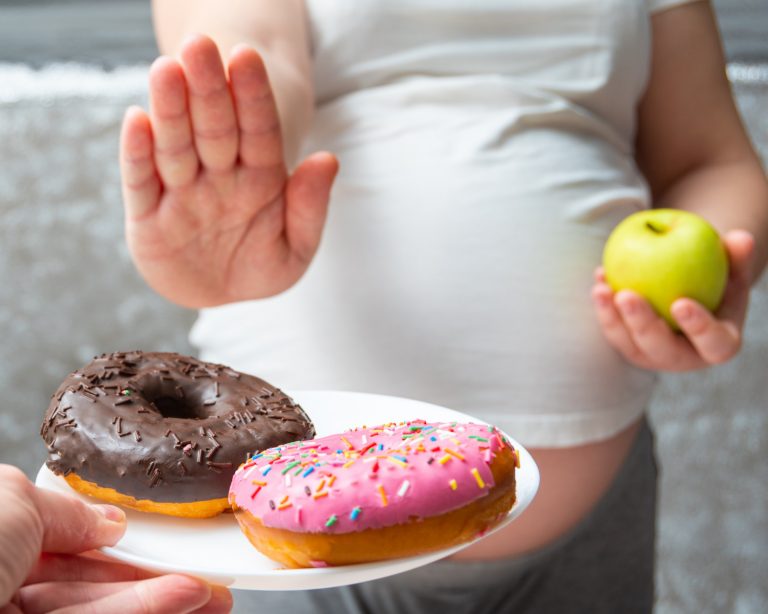Pregnancy is an exciting but long journey that often inspires women to make better lifestyle choices and work towards achieving a healthy body weight. At this stage, your mind gets clouded with different questions, especially when it’s your first pregnancy. Questions like;
- What can I do to ensure my baby is laying well?
- Can I eat this or that?
- How much should I weigh during pregnancy?
Well, there is no one – size – fits all answer but these questions are also relevant.
Keeping your weight in check and maintaining it during pregnancy can reduce your risk of many health issues associated with having a baby. When you are overweighed during pregnancy, you’ll have an increased risk of preeclampsia (high blood pressure), gestational diabetes, cesarean section (C- section), and shoulder dystocia. However, gaining less than the required weight is risky as babies with a lesser birth weight (lower than five pounds and eight ounces) may have trouble breastfeeding, lack proper growth, and have a weakened immune system.
But What is a Healthy Weight During Pregnancy?
The amount of weight that’s considered healthy to gain during pregnancy varies from woman to woman. Yours might be different from another pregnant woman. This is because your estimated weight gain is calculated based on your initial weight before pregnancy. If you weighed less before pregnancy, you’d need to gain more weight than someone who weighed higher than you. Below is a rundown of how much weight you should gain based on your pre-pregnancy body weight.
| ACTUAL BMI | Less than 18.5 | 18.5 – 24.9 | 25.5 – 29.9 | Over 30 |
| RECOMMENDED WEIGHT GAIN | 28 – 40 pounds | 25 – 35 pounds | 15-25 pounds | 11 – 20 pounds |
Ways to Maintaining a Healthy Body Weight during Pregnancy
Maintaining a healthy body weight during pregnancy revolves around eating healthy foods and carrying out physical activities. Below are different tips that’ll help you to achieve this;
1. Eat healthy foods
Yes, pregnancy comes with lots of cravings. You may want to much-up some carbs-loaded doughnuts and bagels or even juicy cheeseburgers, but remember, consuming a balanced diet is the best approach to maintaining a healthy weight during pregnancy. While low-calorie beverages, especially water, may help you and your baby attain the proper amount of weight, it’s also important that you eat nutrient-dense foods. Given below are the three main healthy nutritional choices to help you get started;
- Proteins: It’s recommended that most pregnant women consume at least 70 grams of protein daily. You can get lean protein from Greek yogurt, chicken, eggs, fish, and beans.
- Carbohydrates: Instead of eating some carb-loaded doughnuts, go for veggies, fruits, and whole grains. Keep a distance from junk foods like chips, doughnuts, and ice creams, as they have no nutritional value for you and your baby. You’ll end up accumulating more calories which is bad.
2. Move your body for at least 30mins daily.
Aside from eating healthy foods, staying physically active can help maintain a healthy weight. 30mins of exercise each day will go a long way here. If you can’t go in for a straight 30mins exercise, try breaking down the session into three 10 minutes phases.
In a situation where you were already active before pregnancy, you should keep up the vibe and continue exercising at a rate you’re comfortable with. As you progress over the years, be careful with any activity that puts you at a high risk of falling.
The benefits of regular exercise can never be overstated as it helps both the mother and child; it can even help relieve pain points of pregnancy. But what type of exercise can I do based on the trimester?
For your first trimester
- Yoga
- Swimming
- Running
- Weight training
- Walking
- Biking
For your second trimester
- Yoga
- Swimming
- Walking
- Running
For your third trimester
- Walking
- Jogging
- Low-impact training
- Toning
- Aqua sports
FINAL WORDS
Aside from the stress attached, having a sweet tooth is an add-on feature of pregnancy. It’s completely normal, and I’ve felt it before. But in all these, it’s also important to keep a close check on your calorie intake and move that body always. It’ll benefit both your health and your baby’s health.

